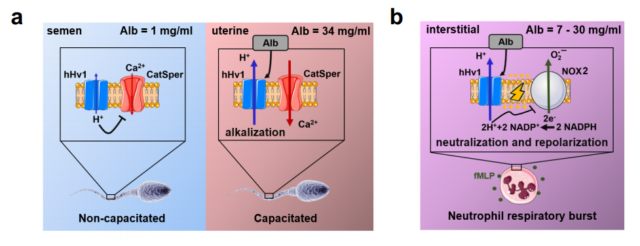The most common protein in blood can activate sperm and fight infection
- Normal Liver Cells Found to Promote Cancer Metastasis to the Liver
- Nearly 80% Complete Remission: Breakthrough in ADC Anti-Tumor Treatment
- Vaccination Against Common Diseases May Prevent Dementia!
- New Alzheimer’s Disease (AD) Diagnosis and Staging Criteria
- Breakthrough in Alzheimer’s Disease: New Nasal Spray Halts Cognitive Decline by Targeting Toxic Protein
- Can the Tap Water at the Paris Olympics be Drunk Directly?
Nature Sub-Journal: The most common protein in the blood can activate sperm and fight infection
The most common protein in the blood can activate sperm and fight infection. For natural life, breeding offspring is an extremely important mission in its life.
However, in modern society, with the increasing pressure of life and the increasing environmental pollution, the infertility rate in countries around the world is showing a soaring trend, and many couples are suffering from infertility.
The emergence of test tube baby technology has helped many couples suffering from infertility to solve the problem. In IVF, albumin supplementation can improve the success rate, but the specific reasons are not fully understood. Albumin (Albumin, Alb) is the most important protein in human plasma, accounting for about 50% of the total plasma protein, which plays an important role in maintaining body nutrition and osmotic pressure.
On June 22, 2021, researchers from the University of California at Irvine published a research paper titled Direct activation of the proton channel by albumin leads to human sperm capacitation and sustained release of inflammatory mediators by neutrophils in Nature Communications.
The study found that albumin (Alb), one of the most abundant proteins in the human body, directly activates the human voltage-gated proton channel (hHv1) to enable human sperm to penetrate the egg and fertilize it, and it can also cause a large number of white blood cells. Secret inflammatory mediators to fight infection.

The human voltage-gated proton channel (hHv1) transports protons from the cell to compensate for the charge and osmotic imbalance caused by metabolism, normalize the intracellular pH value and regulate protein function. Human albumin (Alb) exists in various places throughout the body, regulates osmotic pressure and transports ligands.
In order to determine the physiological connection between the two, the research team discovered that human albumin (Alb) and the human voltage-gated proton channel (hHv1) interact to activate sperm when they leave semen and enter the female reproductive tract. This is because the content of human albumin (Alb) is very low in semen and cannot activate the proton channel, while the content in female uterine fluid is very high, which activates the proton channel after the sperm enters, so that the sperm can be energized and produced The body reacts and fertilizes the egg.
In addition, the research team also discovered that the same interaction between human albumin (Alb) and human voltage-gated proton channel (hHv1) also promotes the production and secretion of neutrophils (a type of white blood cell) to kill bacteria and Inflammatory mediators that fight infection, it should be pointed out that the inflammatory response itself may also lead to the occurrence of diseases.

This study discovered the interaction of human albumin (Alb) in sperm and neutrophils by directly activating the human voltage-gated proton channel (hHv1), which is a new function of human albumin (Alb) that has not been discovered before .
Professor Steve Goldstein, the corresponding author of the paper, said that it is exciting to find that a common protein has the ability to activate proton channels. This discovery proposes new strategies to block or enhance fertility, enhance or inhibit innate immune response and inflammation.
In addition, in addition to sperm capacitation and innate immune response, the human voltage-gated proton channel (hHv1) also involves a wide range of biological processes. This proton channel is involved in cancer cell proliferation, tissue damage during ischemic stroke, and renal hypertension. Has a significant role in damage. Moreover, human albumin (Alb) is ubiquitous in different populations of health and disease at different levels. Therefore, the direct interaction between the two discovered in this study may play an important regulatory role in human health.
The research team said that it is currently studying the effects of the interaction of human albumin (Alb) and human voltage-gated proton channel (hHv1) on viral and bacterial infections in vivo. The next step will be to study the effects of inhibitors of the two effects on infection, inflammation and fertility.
(source:internet, reference only)
Disclaimer of medicaltrend.org
Important Note: The information provided is for informational purposes only and should not be considered as medical advice.



